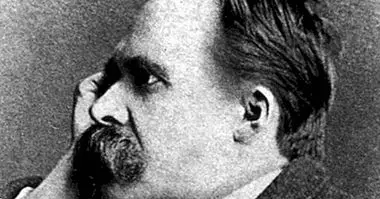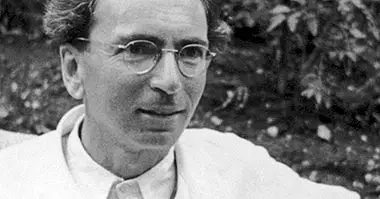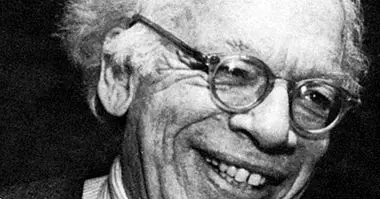Carolyn Wood Sherif: biography of this social psychologist
Carolyn Wood Sherif (1922-1982) was a social psychologist who, among other things, conducted important research on issues such as intergroup conflict, cooperation, power relations, social judgment, prejudices and gender identities.
Wood Sherif's works were carried out in a context that little promoted the participation of women in social psychology, and are also considered as one of the most influential for the development of this discipline. Next we will do a brief review of a biography of Carolyn Wood Sherif , and we will see some of his contributions in social psychology and gender studies.
- Related article: "History of Psychology: authors and main theories"
Carolyn Wood Sherif: biography of a pioneer in social psychology
Carolyn Wood Sherif was born on June 28, 1922 in Indiana, United States. She was the youngest daughter of three brothers, who were soon given an important motivation for high-level studies, especially in exact sciences. His father was assigned to the University of Purdue, with which both Carolyn and his brothers had the opportunity to start an academic training at that institution.
Although her interest was mainly in the world of the humanities, history and other social sciences, the insistence of her father led Carolyn to also learn mathematics. That's how he positioned himself very soon as one of the best students within different branches, before arriving at social psychology .
- Maybe you're interested: "What is Social Psychology?"
Beginnings in social psychology
After having been trained in several disciplines, and once consecrated as a social psychologist, Wood Sherif herself wondered ... how could I have become a social psychologist? (1983). There were not many opportunities to train and practice as a social psychologist in this context, and in addition, the mixed models between professional development and family commitments were unusual.
Turning to the American context of the Second World War, which is where her academic and personal development took place, she answers that It was his desire to do something to improve the world which led her to ask different questions, which gradually brought her closer to social psychology.
Likewise, this desire led him to wonder about the possibilities that this discipline had to integrate the study of human cognition with motivation and social behavior. He was interested, for example, in the social psychology developed by Kurt Lewin, as well as studies in cultural and social organization, as Muzafer Sherif and Frederic Bartlett did.
Carolyn Wood Sherif and Muzafer Sherif
After finishing his studies at Purdue University, he entered the University of Iowa to pursue a master's degree in psychology, which ended in 1944. Subsequently He started working for a research institute in Princeton , New Jersey. Through this position he gained a lot of experience in research, however, he felt that it was a task very alien to the social issues in which he was interested, so he finally decided to resign.
At this time he began to advise on where and with whom to continue studying, and obtained the proposal to work as a researcher also in Princeton, but together with Muzafer Sherif, who was already one of the most important social psychologists.
The drawback now was that Princeton University did not accept female students, with which, Carolyn he started taking courses at Columbia University . Not without doing, in parallel, research with Sherif, especially on the subject of intergroup relations. Years later, Muzafer Sherif would become her husband.
The cave of the thieves
In the following years, Carolyn Wood Sherif and Muzafer Sherif continued to work together at Princeton University, Yale University and Oklahoma University, managing to publish numerous articles and books that are highly consulted in social psychology to this day.
However, due to the frequent neglect of women's scientific activity in this context; it is common that Carolyn Wood's participation in these works is dismissed or directly omitted, and that the credit is reserved only for Muzafer.
One of his most popular research is the classic experiment of the cave of the thieves , where they analyzed the possible origins of prejudices in different social groups, as well as several inter-group dynamics.In very broad strokes, they conducted an experiment with 22 male adolescents in a field area of Oklahoma, where they could observe how group formation occurs, how social hierarchies are created; and what are some of the origins of friction, hostility and integration.
- Maybe you're interested: "The thieves' cave experiment: creating conflicts from nothing"
Academic activity and lines of research
In the year of 1958, Carolyn Wood Sherif began to form in a doctorate program of the University of Texas, under the supervision of Wayne Holtzman and the accompaniment of Muzafer Sherif and his three daughters. It was titled in 1961, and He directed a project in the Office of Vocational Rehabilitation of the United States , where he focused on studies on self-concept and youth.
She also worked as an associate researcher at the Institute of Group Relations in Oklahoma and published numerous articles and books on youth, reference groups, attitudes and social justice. Finally, in the decade of the 60's his interests focused on psychology and gender, specifically on gender identity, roles, and their reproduction. The latter coincided with the feminist movements of the same decade, which favored both their academic recognition and their militancy.
In this context he presided over division 35 of the American Psychological Association (APA), during the 70's, which It is known as the Society of Psychology of Women . Her works and her experience made her worthy of several recognitions, among which are prizes of distinguished publication and awards for her contributions to education in psychology.
In the same sense, the division 35 of the APA has dedicated a prize in his honor (the Carolyn Wood Sherif Award), through which recognizes the work of teaching, research and professional leadership in the psychology of women, both psychologists as psychologists.
Bibliographic references:
- George, M. (2011). Profile Carolyn Wood Sherif. Psychology's Feminist Voices. Retrieved June 27, 2018. Available at //www.feministvoices.com/carolyn-wood-sherif/.
- O'Connell, A. and Russo, N. (1983). Models of achievement: Reflections of eminent women in psychology. New York: Columbia University Press.



















